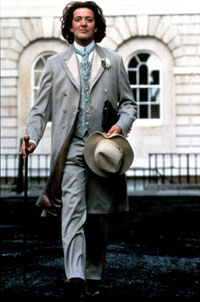The most lingering impression as I finished the film was the kindness in the personal character of Wilde as portrayed by Fry, which came as a warm and welcome surprise.
I think it is fair to say that Wilde was often provocative in his clever ways, as indicated by the remark attributed to him "I have nothing to declare but my genius". Wilde was making statements to the customs as he entered the United States.
With knowledge about Wilde's flamboyant manners in the background, I was tacitly assuming that the imprisonment of Wilde
was a result of his extravagance, although ultimately justifiable by aesthetic judgment by the author at that time, and by moral standards of the average citizen of today. However, the film portrayed Wilde's downfall as ultimately coming from his kindness.
Wilde was not trying to show off "the love that dare not speak its name". Quite contrary to it. Wilde was very discreet. It was the emotional confrontation between Wilde's lover, Lord Alfred Douglas (nicknamed "Bosie", wonderfully played by Jude Law) and his father the 9th Marquess of Queensberry which dragged Wilde into a court action.
Seeing the film, I realized that Oscar Wilde's downfall was a case of kindness paving one's way to destruction. Which surely happens from time to time. A sobering realization of the conditions of this strange tragicomedy we call "life".

Stephen Fry playing Oscar Wilde in the film "Wilde" (1997)
1 comment:
I find your review of the 1997 film "Wilde" convincing. Your argument that Oscar Wilde's kindness is responsible for his downfall makes a lot of sense to me, because I regard kindness or kindheartedness as liability, which can cause damage and destruction, rather than asset. I also believe that an individual character defines his choice and subsequently his fate. My belief is based on my experience and also my reading of an article about American playwright Sam Shepard, who says "a character is something that cannot be helped," like "destiny." I have no doubt about it--the film succeeded in presenting Wilde as the victim of his attribute, kindness.
It is a pity that I have not seen the whole of the film "Wilde". I saw the latter part of the film when it was aired on TV some years ago. It graphically portrays Wilde being incarcerated for homosexuality and subjected to a degrading labor. I feel pained when I recall the film's forlorn image of Wilde who was completely humiliated, before ending his life in the gutter.
Post a Comment